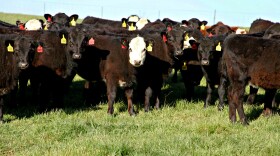
Kristofor Husted
Kristofor Husted is a senior reporter at KBIA in Columbia, Mo. Previously Husted reported for NPR’s Science Desk in Washington and Harvest Public Media. Husted was a 2013 fellow with the Institute for Journalism and Natural Resources and a 2015 fellow for the Institute for Journalism and Justice. He’s won regional and national Edward R. Murrow, PRNDI and Sigma Delta Chi awards. Husted also is an instructor at the Missouri School of Journalism. He received a B.S. in cell biology from UC Davis and an M.S. in journalism from Northwestern University.
-
NewsCattle ranchers know that making the best steak starts with the genetic makeup of the herd. Now those genetics have taken a historic leap thanks to new, predictive DNA technology.
-
NewsMushrooms that don't brown? Pigs resistant to diseases? Though the process does not introduce foreign genetic material into food or livestock, getting consumers to buy in will be an uphill battle.
-
NewsDuring the day on Aug. 21, large swaths of farmland will be plunged into darkness, and temperatures will drop about 10 degrees. And scientists are waiting to see what happens on the ground.
-
NewsWhile grocery stores had been losing customers to smaller markets and online shopping, "groceraunts" — with seasonal menus and alcohol — are luring back foot traffic to the old-school grocers.
-
These sugary spuds are cheap and easy to grow, but the rise of postwar industrialization and processed foods made them less popular. Now, fad diets and trendy restaurants have sparked a renaissance.
-
Small firms are popping up in the rural Midwest that buy old barns to feed remodelers' demand for weathered wood. As more historic barns come down, is the iconic American rural landscape fading away?
-
Researchers are trying to figure out what cows are saying to each other — and us. Often, it seems that cows moo to communicate that something is wrong, or different.
-
A coalition of more than 200 agriculture groups wrote an open letter urging Congress to approve the trade deal, saying it'll help U.S. farmers stay competitive in an increasingly crowded world market.
-
NewsFarmers use millions of pounds of pesticides each year to protect crops from weeds and insects. When those chemicals drift to neighboring property, they can ruin crops on organic farms.
-
Fresh fruits and vegetables can be hard to come by for low-income people who rely on food pantries. So some aid programs are now handing out seeds and plants and teaching clients to grow their own.









